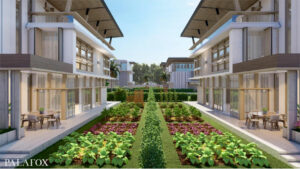DAMOSA Land, Inc. (DLI) targets to complete its inaugural agri-residential project Kahi Estates in Davao City by 2027, the real estate and agro-industrial developer said.
“Set for completion in October 2027, Kahi Estates will cover five hectares with 48 lots available to the public,” DLI said in an e-mailed statement last week.
The project features an open-lot subdivision, with areas ranging from 550 square meters (sq.m.) to 600 sq.m.
The name for the project was derived from the Cebuano word kahilom, which means peace and tranquility, according to the company. This reflects the real estate developer’s goal to promote wellness and a deeper connection with the environment, it said.
“Designed in partnership with Palafox Associates, led by renowned architect and urban planner Architect Felino “Jun” A. Palafox, Jr., Kahi Estates takes inspiration from the concept of ‘Ecopolis,’ or a harmonious blend of the environment within a city,” DLI said.
The property will incorporate sustainable design elements, namely eco-friendly homes, urban gardens supporting farm-to-table living, and rainwater harvesting systems via butterfly roofs to efficiently collect water for gardening uses, according to the company.
It will also feature amenities like a clubhouse and linear park where residents can enjoy quality time.
The project also aims to promote smart living by cutting energy consumption and incorporating “green” infrastructure.
To showcase environment-friendly designs, the property will retain its fruit-bearing trees, enhance open spaces, incorporate tree-lined and shaded streetscapes, ecological restoration, and provide access to community farms and vegetable gardens.
“In Kahi Estates, we envision creating a residence where people can embrace sustainable living and better appreciate agriculture and the environment,” DLI President Ricardo F. Lagdameo said during its groundbreaking ceremony on Oct. 15.
“We want this new project to serve as a model not only for our future developments but also for other property developers aiming to adopt sustainable practices.” — Beatriz Marie D. Cruz
